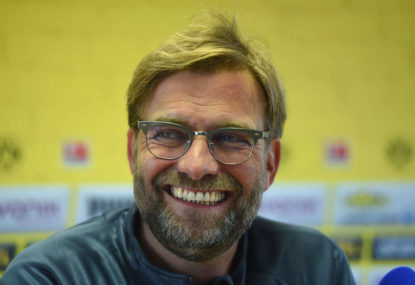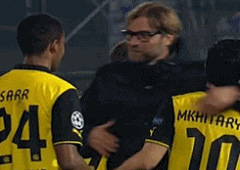Liverpool strike verbal deal to Slot in Dutchman as new boss with Klopp's seal of approval
Liverpool have reached a verbal agreement with Feyenoord for their head coach Arne Slot to succeed Jurgen Klopp at the end of the season.…

Late on Saturday evening in Germany (Sunday morning Sydney time), the 72nd DFB Pokal – the annual German Cup football competition – will kick off at the Olympic Stadium in Berlin.
And of all the narratives that have been told in the lead up to the match, one dominates. The game will be the final match of Dortmund’s outgoing coach Jürgen Klopp.
Klopp – who took Dortmund to two Bundesliga titles, one German Cup title and a Champions League final in his seven years in charge – announced he would leave the club in April this season, saying simply that “the time was right for the two to part”.
Coaches come and go all the time in the Bundesliga – the relegation-challenged Hamburg have had 14 in the seven years Klopp has been at Dortmund – but Klopp’s departure was particularly special.
Us in the English-speaking world are generally unlikely to know a coach unless he plies his trade in the EPL, for a national side or at Real, Barca or Bayern. So, it is unsurprising that many casual fans asked what the fuss was all about when he retired. Britain’s The Telegraph even sent a reporter who didn’t speak German to cover the press conference. (His ‘As It Happened’ blog was hilarious, but completely pointless to anyone who was actually interested in the story).
Klopp’s announcement was the biggest story in German football since July 2014 – when the Germans won the World Cup. And for many Germans – who are notoriously unpatriotic at the best of times – it was far bigger news.
Especially for those clad in yellow and black.
To say Dortmunders love Herr Klopp is like saying Germans are pretty keen on football. They adore him. When he announced his retirement, they wept for him. They told him they would love him forever. They even got tattoos.
Such is the cult of personality surrounding Klopp, following his last home game, Dortmund broadcast a huge five-minute long farewell message from Klopp on the big screens at the stadium. It was like the Wizard of Oz as Klopp’s giant head was projected for all to see, with 80,000 silent fans hanging on his every word.
Even fans of the away side Werder Bremen, who had just had their European dreams quashed by a 3-2 loss to the yellow and black, stuck around to see what coach Klopp had to say.
The Dortmund fans are a passionate bunch. They have the largest average crowd of any European football side. Their 80,000-seat stadium is sold out pretty much every match. That’s 5,000 more than Manchester United and 10,000 more than Barcelona, Real Madrid and rivals Bayern Munich.
At the ground, the Südtribüne – the Southern Stand – is the largest free standing grandstand in Europe. And it’s the home section, meaning at home games visiting teams are greeted by around 25,000 Dortmunders in yellow and black.
The fans give it the not very inventive, but very German nickname “Die gelbe Wand”, meaning ‘the yellow wall’. And anyone who has ever been there – let alone played there – know exactly whose side they are on.
When Klopp joined the side in 2008 from Mainz – the club he had played for and later coached for 19 years – European football’s sleeping giant were broken. They had just finished in 13th place and were bankrupt – a shadow of the side that had surprised everyone in 1997 by being only the third German club ever to win the Champions League.
He began to almost immediately turn the club around, showing his tactical brilliance while becoming a father figure to young players. He could be seen prowling the sideline, hugging, hi-fiving and even slapping his players for encouragement.

As a player, Klopp was beset by injuries and fitness problems. He said upon his retirement that he “had the talent for the fifth division, and the mind for the Bundesliga. The result was a career in the second division.”
Even for non-Dortmund fans, Klopp became a favourite. He was famous for his post-match interviews. In a country which takes everything seriously – especially football – he managed to act like a fan who wondered what all the fuss was about.
After Dortmund beat rivals Munich 5-2 on the night of the 2012 German Cup final, he was asked if things could be any better for his side. He replied “it could have been warmer”.
But on the pitch, he was nothing but passion. And while European football is not short on coaches who are overtly passionate – it doesn’t take too many losses for a football coach to be tapped on the shoulder by an impatient overseas billionaire – Klopp was something more.
Passion is one thing, but what is rare is that a coach can be genuinely terrifying.

That little outburst cost Klopp a short suspension, but endeared himself to football fans – and probably sports fans – everywhere.
Over time however, the financial realities of being pit year after year against Bayern Munich caught up with Klopp and the Dortmunders. Each year he had to deal with his best player being signed by the Bavarian giants. First World Cup hero Mario Götze, then leading striker Robert Lewandowski.
Each year he had to rebuild his team after Munich had claimed one of his own – even just to stick the guy on the bench. And in 2014-15, it appeared too much. His side was dead last in January, and even though they managed to fight back, they only finished seventh after finishing either first or second in the past four years.
But the closeness he built among his players was legendary. Even when playing against each other, the players’ affection for each other was evident – even while trying to look tough – as this clip shows (please don’t blame me for the music, I totally didn’t choose it).
But back to the DFB Pokal. Aside from Klopp’s departure, there are plenty of other stories that surround the match – the other one being the age-old giant of German football (Dortmund) versus rich kid on the block (Wolfsburg).
Dortmund’s opponents in the green corner are Wolfsburg, who came second in this year’s Bundesliga. With stars like Andre Schurrle and Kevin de Bruyne, they dominated the second half of the season – thrashing eventual champions Bayern Munich 4-1 in January.
Wolsburg is the richest city in Germany per capita ($US130,000 P/A), largely as the city is the headquarters of car giant Volkswagen. The city was founded in 1938 by the Nazis to house the workers of the Volkswagen plant.
While it would be tempting to go all Tarantino and present this as a good guys versus Nazis battle, a little history is important. Volkswagen (People’s Car) was created by the Nazis in the late 1930s as part of Hitler’s promise to give every German a car.
Needless to say, for anyone who has an idea of what happened in the next ten years in Germany and across Europe – the election promise was a popular one.
Since Klopp’s departure, there has been plenty of speculation linking him to Liverpool, Manchester City, Napoli, Real Madrid or any other team that hasn’t got a trophy in their hands right at this very moment.
For his part, Klopp has all but indicated that if he is to coach again, England is likely to be the destination – even if just for language reasons. And while another people’s club with a famous history like Liverpool or Arsenal would be a perfect fit for the man who wears his team’s training shirt and sweatpants to every match like a fan on the couch, refusing a chance to play Fantasy Football with the kind of money Man City throw around would be hard for any football fan, let alone a coach.
A win for Klopp in his last match would complete the fairytale for Dortmund and their passionate fans.
As any sports fan knows, fairytales have more in common with fairy floss and fairy dust than fairness, but the sight of an inebriated Klopp returning to Dortmund’s Innerstadt with the trophy in hand just one more time would be the perfect way to end his association with the yellow and black.
And finally, here is some fan footage of Klopp after his side won the Bundesliga last time around, obviously lacking in voice, screaming in German about how the side were planning to head back to their home ground and engage in a penalty shootout.